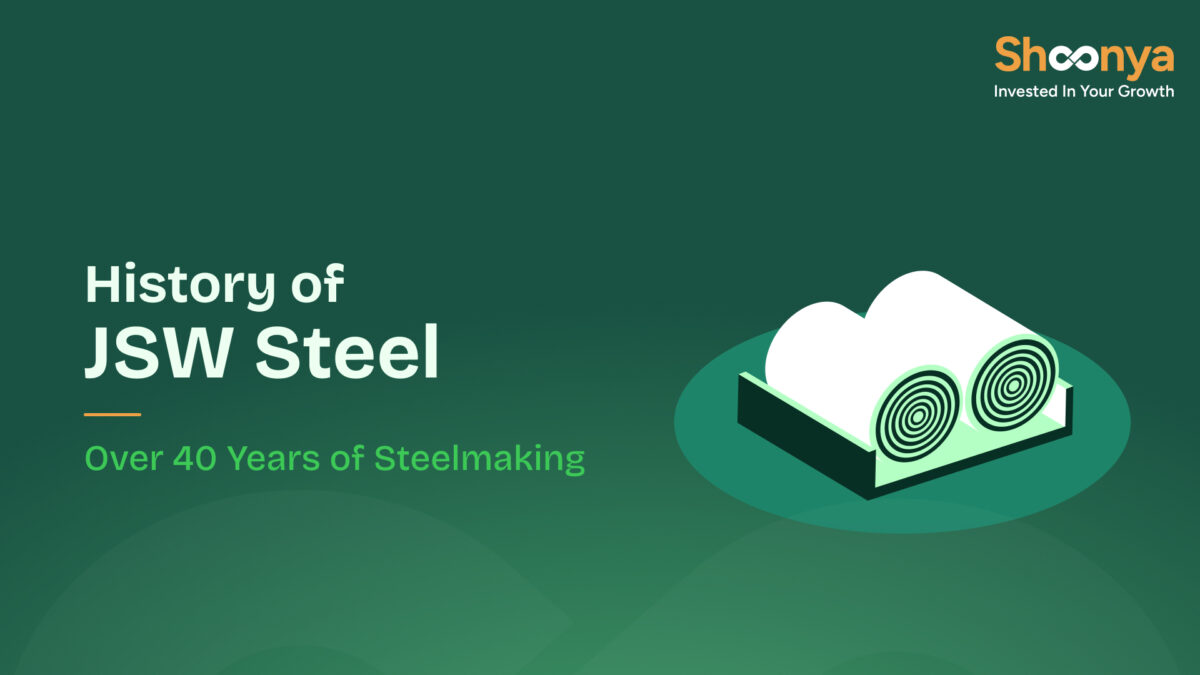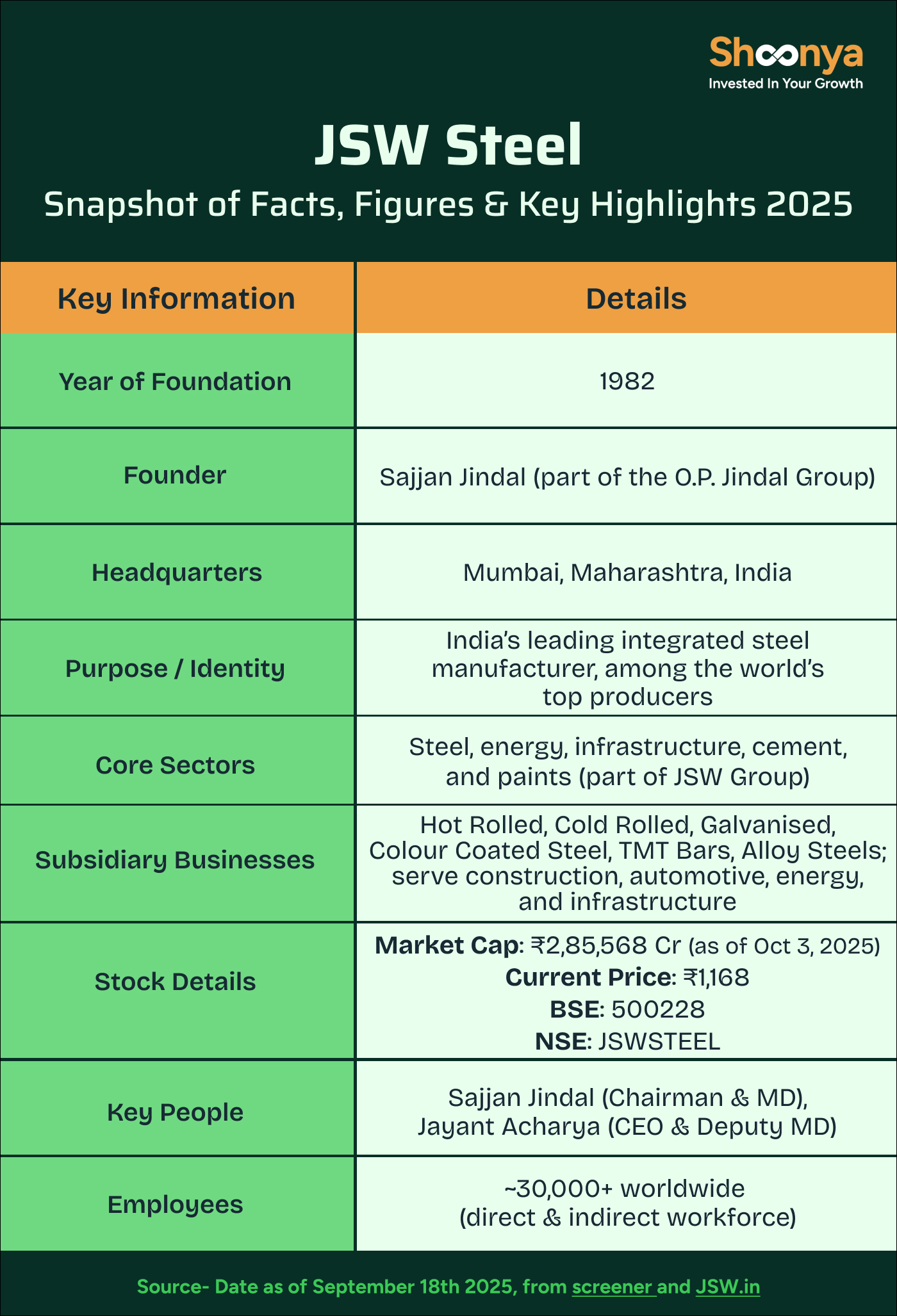JSW Steel Ltd: 40 Yrs of Trust, Strength, & Always Around You

Steel is all around us; in the bridges we cross, the cars we drive, and even the appliances in our homes. For the past 40 years, one name that has been associated with the steel industry is JSW Steel Limited.
What began in 1982 as a modest steel plant at Vijayanagar is today one of India’s largest and the world’s leading steel producers. Today, it operates India’s largest single-location steel plant and has expanded its presence across international markets.
But JSW Steel is not only about producing steel. It is about trust, commitment, and strength; values that have guided the company for four decades. So, no surprise, JSW Steel ranks among the top 10 companies in the Nifty Metal Index for its performance and leadership in India’s metal sector.
Let’s understand how JSW Steel, being “Always Around,” continues to grow in the core sectors of energy and infrastructure.

History of JSW Steel Limited and Milestone Achieved
The Early Days (1982–1990s)
In 1982, Jindal Group established its first steel plant at Vasind, near Mumbai. This project was set up by Jindal Iron and Steel Company. At that time, India’s steel industry was still in its early stages, and demand was just starting to increase.
JSW’s focus was to produce quality steel that could power India’s industries and infrastructure. The company quickly expanded operations with new plants at Tarapur and Salem.
By the 1990s, JSW Steel had become more than just a small producer. It was steadily becoming a trusted name in construction, automobiles, and consumer goods.
Expansion Years (2000–2010)
In the 2000s, JSW Steel moved from being a growing steelmaker to becoming a true industry leader.
In 2005, Jindal Iron & Steel Company (JISCO) and Jindal Vijayanagar Steel Ltd (JVSL) merged under a swap ratio of 1:16, consolidating their assets and operations. It became India’s largest single-location steel plant. This gave JSW Steel the scale and strength to meet the country’s rising demand. Soon after, JSW acquired Salem Steel Works, adding to its production footprint in Tamil Nadu.
In 2008, the company also ventured overseas with a rebar joint venture in Georgia, marking its initial steps into international markets.
JSW also expanded its product portfolio, launching hot-rolled coils, galvanised steel, and high-strength steel designed for sectors such as automobiles and infrastructure.
Growing Period (2010–2024)
In 2010, JSW Steel expanded its domestic base by acquiring the Dolvi plant in Maharashtra, which provided it with integrated capacity and a more diverse product mix.
Further, the merger with JSW Ispat helped streamline operations and cut costs. Together, these steps cemented JSW’s position as one of India’s leading steel producers.
In 2018, JSW Steel acquired Italy’s Aferpi long-products unit to strengthen its foothold in the European market. The company’s JV with JFE Steel of Japan adopted advanced technology and high-grade electrical steels, making JSW a stronger supplier to the automotive and power sectors.
In late 2024, JSW acquired Thyssenkrupp’s Electrical Steel India business, expanding its portfolio in grain-oriented electrical steels (CRGO/CRNGO.
By 2024, JSW Steel was no longer just India’s leading steelmaker. With investments in raw material security, such as overseas coal and iron ore assets, and the expansion of plants like Vijayanagar and Dolvi, the company had built scale, resilience, and a strong global presence.
2025: Year of New Milestone
In July, the company dedicated its major ₹20,000 crore capital expenditure (capex) for FY 26 to expanding its Dolvi plant. It increased its capacity from 10 million tonnes (Mt) to 15 million tonnes (Mt) by September 2027.
In August, JSW Steel signed a joint venture with Japan’s JFE Steel to invest ₹58.45 billion (~US$669 million) to boost production of electrical steel (CRGO) in India. The Nashik plant capacity will scale from 50,000 to 250,000 tons per annum, and the Vijayanagar unit will also see expansion.
JSW Steel has entered a joint venture with the APMDC to develop the Konijedu Marlapadu Integrated Iron Ore Project in Andhra Pradesh. The project involves mining and beneficiating low-grade iron ore to produce high-grade concentrate, which will be used as a raw material for steel manufacturing.
Recently, in September 2025, India’s Supreme Court cleared JSW Steel’s ₹19,700 crore resolution plan for Bhushan Power & Steel (BPSL).
Latest Quarterly Snapshot of Q1 FY 26
In the June 2025 quarter (Q1 FY26), JSW Steel delivered the following results:
- Revenue from Operations: ₹43,147 crore (↑0.5% YoY from ₹42,943 crore)
- Net Profit (PAT): ₹2,184 crore (↑158% YoY from ₹845 crore) – beating market estimates due to higher volumes and lower coking coal costs.
- EBITDA: ₹7,576 crore (↑37% YoY), with an operating margin of 17.6%
- Crude Steel Production (Consolidated): 7.26 million tonnes (↑14% YoY)
- Sales Volume: 6.69 million tonnes (↑9% YoY) – domestic sales up 12%, exports down 20% due to weak international demand
- Capacity Utilisation (Indian Operations): 87% (down from 93% in Q4 FY25 due to planned maintenance shutdowns)
- Net Debt (as of June 30, 2025): ₹79,850 crore (up ₹3,287 crore from March 2025, mainly on working capital investments)
JSW’s Vision for the Future of Building India
Guided by the tagline “Always Around,” JSW Steel aims to be present in every structure, every industry, and every community that shapes modern India.
The future of JSW Steel rests on three pillars:
- Sustainability
- Innovation
- Nation-building
The company has committed to becoming carbon neutral by 2050, investing heavily in green steel technologies and integrating renewable energy.
The company’s objective is to capture a significant portion of the anticipated 160 MTPA steel shortfall in India over the next 10-12 years, as demand is expected to outstrip supply due to rapid infrastructure development.
Further, stock market analysts and industry experts believe the company is aiming well beyond its stated target of 45 million tonnes per year by 2030. According to them, the long-term goal is to reach nearly 100 million tonnes annually over the next 10–15 years, compared to its current capacity of 18 million tonnes per year.
The top management is non-committal about its exact capacity expansion plan. Still, stock market analysts and sector experts believe the company is looking to expand far beyond its targeted 45 million tonnes per year by 2030. Analysts say the plan is to achieve 100 million tonnes a year in the next 10-15 years; the current capacity is 18 million tonnes.
Its role as the flagship of the $24 billion JSW Group ensures its impact spreads across cement, paints, infrastructure, and energy. Together, these businesses support India’s cities, homes, transport, and industries.
CSR & Social Impact of JSW Steel
JSW Steel, through the JSW Foundation, runs one of the most active CSR programs in India.
The following are the key areas and initiatives they have primarily worked upon.
- Education: JSW Steel is constructing schools in remote areas like Kaafnoo, Chansoo, and Kilba. It has partnered with the SAMPARK Foundation to enhance teaching, ensuring quality education reaches children in underserved communities.
- Women Empowerment & Livelihoods: Through the CHARKHA Handloom Programme, JSW Steel empowers over 300 women artisans by connecting them with national trade fairs such as Dilli Haat and Kinnaur Mahotsav.
- Healthcare & Nutrition: Healthcare initiatives include multispecialty health camps conducted in partnership with AIIMS Bilaspur and IGMC Shimla, bringing medical services to rural communities. The company also distributes nutrition baskets to 327 TB patients under the TB Mukt Bharat Abhiyaan. Its Urja Community Clinic and ambulance services have further benefited over 12,000 people.
- Sports Promotion: Another key focus area is the SHIKHAR Boxing Programme, which trains over 90 rural youth across Himachal Pradesh.
- Environmental Sustainability: JSW Steel promotes clean energy and environmental conservation by installing 122 solar streetlights and solar geysers in hilly villages prone to power outages.
- Community Development: JSW invests in infrastructure such as roads, toilets, rain shelters, cremation sheds, and CCTV systems, making villages safer and more livable. Through its Integrated Livestock Development Programme, it has benefitted over 6,000 farmers and improved the health of 18,000 livestock, further supporting rural livelihoods.
Conclusion
From one small plant in 1982 to becoming one of the world’s leading steelmakers, JSW Steel Limited has come a long way. For over 40 years, it has grown with India, helping build our bridges, cities, industries, and homes. Furthermore, JSW Steel is committed to making growth more sustainable through the production of green steel and the development of cleaner technologies. Its goal is not just to make more steel, but to create a stronger, self-reliant India.
JSW Steel Limited-FAQs
JSW Steel was founded in 1982 as Jindal Iron and Steel Company, later merging into the JSW Group.
JSW Steel was founded by Sajjan Jindal, part of the O.P. Jindal family.
JSW Steel’s headquarters is in Mumbai, Maharashtra, India.
JSW Steel is primarily engaged in the manufacture and sale of iron and steel products, serving industries like construction, infrastructure, automobiles, and consumer durables.
JSW Steel produces hot-rolled and cold-rolled steel, galvanised steel, colour-coated sheets, TMT bars, alloy steels, and wire rods.
Through the JSW Foundation, the company invests in education, healthcare, women’s empowerment, sports, environment, and rural development, impacting millions of people across India.
JSW Steel has a crude steel capacity of about 29 million tonnes per annum (MTPA) in India and is expanding to reach 50 MTPA by 2030.
Disclaimer: Investments in the securities market are subject to market risks; read all the related documents carefully before investing.








